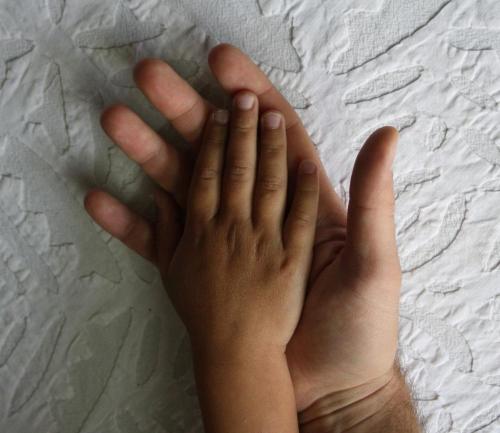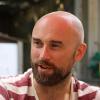
As my son grows up, he and I are becoming aware of one big difference between us: I have white skin and he has brown skin.
We sometimes play a game in which I have to pretend that his arms are made of chocolate and I try to eat them, much to his amusement. Then he reminds me that he is not in fact a chocolate bar, but a little boy, and we both laugh. Things like this are really funny when you are five years old and have brown skin.
But sometimes he asks me why he and his mother have brown skin whilst I have white skin. Then we talk about his Pakistani and English heritage, and about why we live in Nepal; and about Muslims and Christians, and Buddhists and Hindus; and whether there is a God and whether he lives with Buddha in heaven; and whether Buddha is bigger than Jesus because he is older; and why Jesus was not at his own birthday party when we went to church once on Christmas Day in England. "Is Jesus alive?" he asks me. "Well, that is an interesting question", I reply. It is a lot harder to answer than why Muslims say a prayer for the life of chickens before they kill them, like Nana-Abu did outside our house once with Uncle Javed.
Yet behind all the fun and games and five-year old philosophy, my son's growing awareness of his identity unsettles me. To the outside world he will grow up as an Asian man with a Muslim name, in a world dominated by white men like me. This is something I cannot personally relate to, and it concerns me.
I have always been against racism – like most reasonable people profess to be – but racism is not something which I can honestly say has much affected me. Of course I have had my fair share of Indians staring at me in the street in Delhi and taxi drivers in Kathmandu charging me a higher price than the locals. But these things do not dis-empower me or make me a second-class citizen (quite the opposite in fact, they reaffirm the social status and financial means I am assumed to have because of my skin colour). I have no idea what it must be like to grow up with brown skin.
I hear stories of course from my wife and my Asian friends of what it is like to be non-white. They tell me how they have been strip-searched when trying to enter the United States and how they get ignored at expat parties because the white guests think they are Nepali staff with nothing of value to say. "That's awful!" I say, outraged. I am shocked that educated and well-travelled Europeans might ignore someone just because they have got brown skin. "You get used to it", says my wife, as she shrugs her shoulders, having had a lifetime to learn to accept such attitudes.
Then I think of my own son, possibly facing the same subtle prejudices throughout his life, and it angers me. Like any father I want to protect him. I want to tell people that he is just like me and should be treated the same as me, but I know that I cannot always be there for him.
The Charlie Hebdo attacks in Paris and Boko Haram atrocities in Nigeria in January were to significantly influence the way I thought about these issues. In one case a group of twelve predominantly white men were horrifically murdered by some brown men with Muslim names, resulting global media coverage, an outpouring of emotions and visits to Paris by world leaders to show their solidarity with the victims. In the other case, about 2,000 black people were brutally murdered by some other black people and it barely made the news. It certainly did not result in visits to Nigeria by international dignitaries.
Rupert Murdoch tweeted that all Muslims should be held responsible for the “jihadist cancer” and Fox News wrongly reported that there had been no Muslim outrage at the Paris attacks. As if the pain caused by a 'mistaken' War in Iraq, Guantanamo Bay, Abu Ghraib, the bombing of Gaza and deadly drone strikes in Muslim countries had never happened, Muslims were being criticised for failing to have a sense of humour about seeing their holy Prophet humiliated in derogatory cartoons, and for failing to tackle violence in their ranks. The fact that 99.9 percent of Muslims in the world just want to get on with their peaceful lives and are unable to relate to terrorism and jihad any more than your average white guy can, was irrelevant. As a community they would be scrutinised by the Western mainstream to see how they responded, or failed to respond, as the case may be.
For me this issue had now become personal. It was not just about Muslims per se, but about my wife and my son, and how they are viewed by Western society.
Yet, whilst I could see through the double-standards of this discourse, many of my friends were changing their Facebook profile pictures to 'Je suis Charlie' and proclaiming that the terrorists had gone too far. In doing this they seemed to be unaware of the many innocent non-white people who die every day in developing countries – at the hands of terrorists, governments and Western military interventions – with little media coverage and no campaigns of solidarity with the deceased. In fact, a recent article by the Pakistani-American journalist, Rafia Zakaria, claims that Muslims are more likely to experience war and displacement than any other religious group[1].
The question that went through my mind was – would they have held a solidarity campaign for my brown-skinned son if he was a victim of a terrorist attack in Nepal?
* * *
In Moshin Hamid's acclaimed novel, The Reluctant Fundamentalist, the main character, Changez, reflects upon America's reaction to the horrific terrorist attacks on the Twin Towers in 2001. He says: "As a society, you were unwilling to reflect upon the shared pain that united you with those who attacked you. You retreated into myths of your own difference, assumptions of your own superiority. And you acted out these beliefs on the stage of the world, so that the entire planet was rocked by the repercussions of your tantrums, not least my family...".
When he talks about being unwilling to reflect on shared pain, and of America's assumptions of superiority, he is not just speaking to Americans, but to the British after 7/7, and to the French after the Charlie Hebdo attacks. When he speaks about his family in Pakistan, he is also speaking about my Muslim family in England, in Pakistan, and here in Nepal.
An Australian friend of mine tried to reassure me by saying: "Martin, at least we can see the hypocrisy for what it is; at least we can understand what is happening in the world". But this did little to console me. I was thinking of the Brazilian philosopher, Paulo Freire, who famously said that: "washing ones hands of the conflict between the powerful and the powerless means to side with the powerful, not to be neutral”.
So whilst the predominantly white 'Je suis Charlie' activists were busy laughing at pictures of the Prophet Mohamed to prove their point, and many Muslims were too scared to speak out for fear of reprisals or being seen as apologists for the terrorists, I realised the power I held – and indeed the responsibility I held – as an educated white person to speak up for those who were less able to speak up for themselves (at least less able to speak up without fear of reprisals). I recognised my relative position of safety – free from being targeted by Rupert Murdoch's and Fox News' witch hunts – to challenge the polarising discourse that was evolving around Muslims and violence.
So it is in this context that I wish to use my position to say the following. If we are ever to overcome extremism and terrorism, then we first need to mourn for the victims of all societies, regardless of their colour or creed. We need to find unity in our pain as well as our hopes for a more peaceful world. We need to search within ourselves to find empathy for the 'other' until we realise that there is in fact no 'other' and there never has been. I don't say these things for myself, but for my five year old brown-skinned son and the world that he will inherit.
My son may not be the same as me, but this is no excuse for him to be treated any differently from white people. I want him to grow up in a world where he will not be expected to apologise for criminals he has nothing to do with; he will not be strip searched by United States border controls; he will not be ignored by white people at parties; and he will be free to write blog posts like this without fear of repercussions. I want him to grow up in a world where people can recognise that the differences between him and me are only skin deep.
For more information see #MuslimLivesMatter.
[1] Zakaria, R. 2015. “Let’s talk about the other dead journalists: Selective mourning of Western journalists ignores the pain and sacrifice of their Muslim colleagues” in Al Jazeera America. January 10th, 2015. See: http://america.aljazeera.com/opinions/2015/1/charlie-hebdo-deadmuslimjournalistsfreedomofspeech.html (Accessed: February 11th, 2015).










Comments
Terrorism & islamaphobia
Add new comment